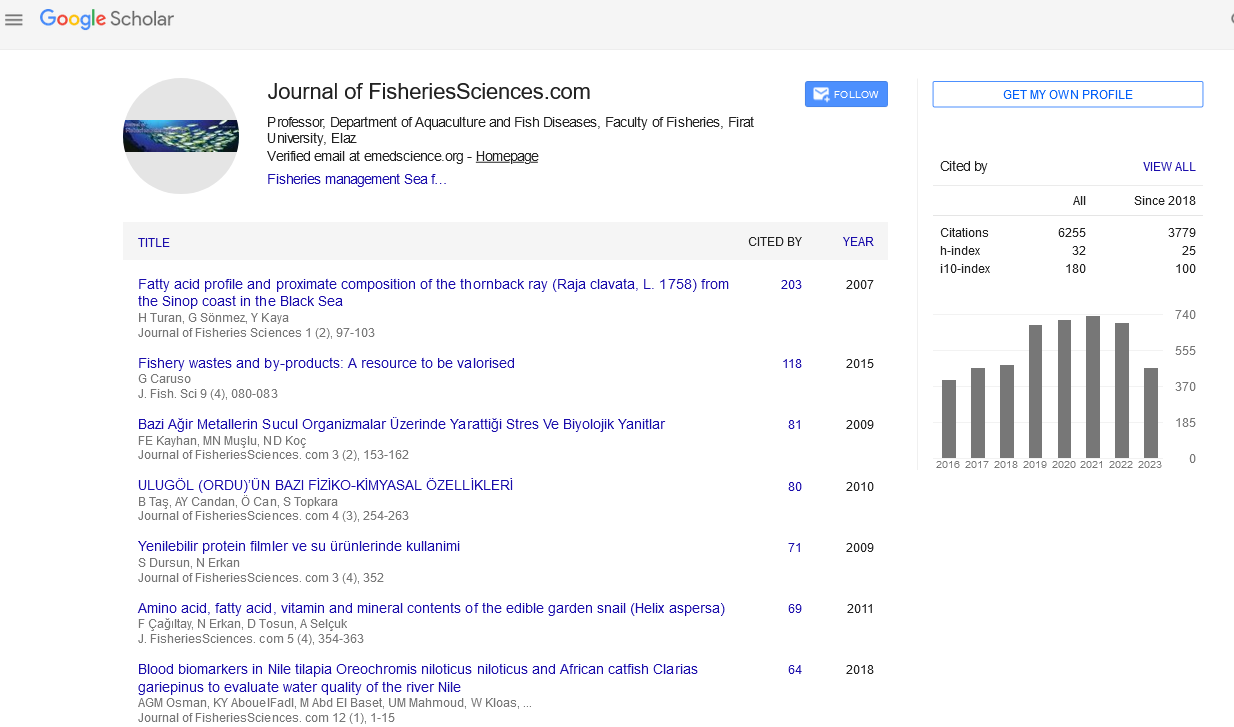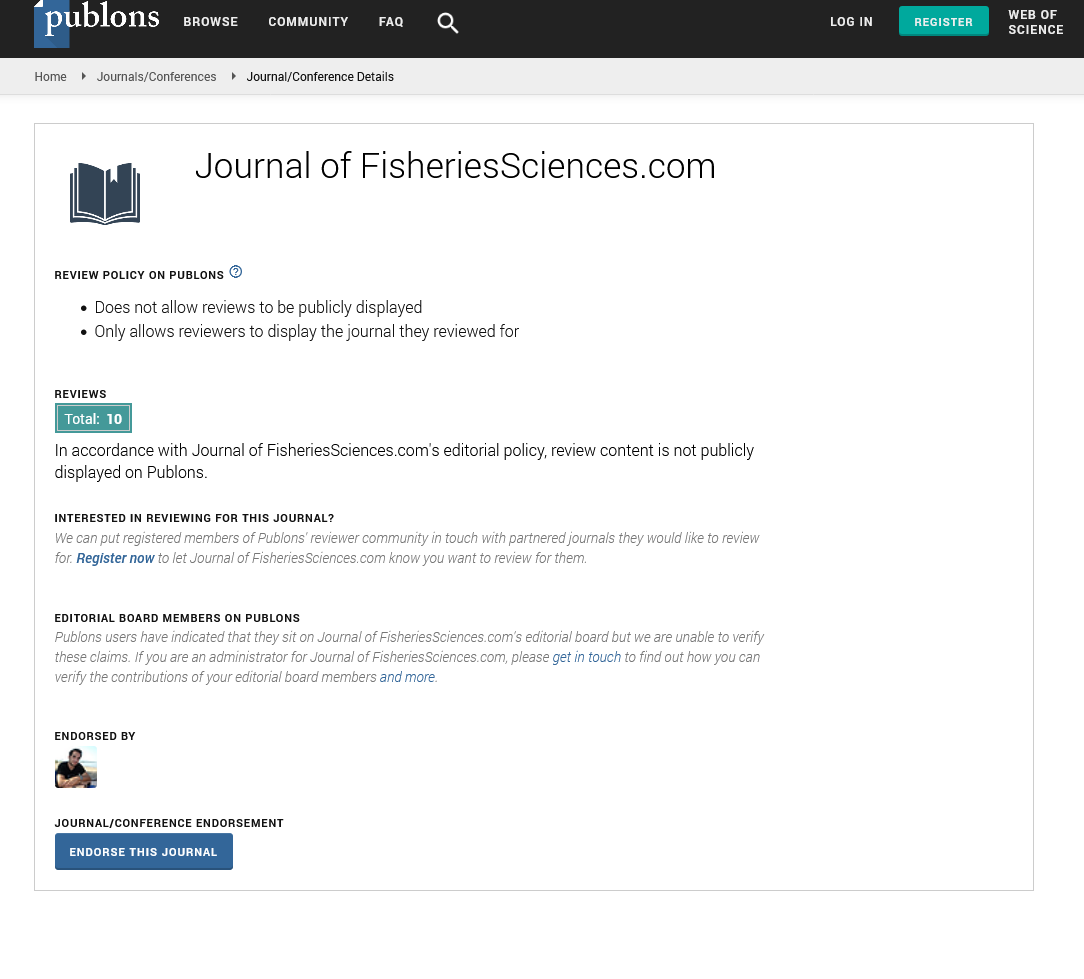Perspective - (2022) Volume 16, Issue 11
Impact of Finishing Management on Target Species
1Department of Fisheries Science, University of Maiduguri, Nigeria
*Correspondence:
Obinna Musa, Department of Fisheries Science, University of Maiduguri,
Nigeria,
Email:
Received: 02-Nov-2022, Manuscript No. 11598;
Editor assigned: 05-Nov-2022, Pre QC No. IPFS-22-11598 (PQ);
Reviewed: 16-Nov-2022, QC No. IPFS-22-11598;
Revised: 22-Nov-2022, Manuscript No. IPFS-22-11598 (R);
Published:
29-Nov-2022, DOI: 10.36648/1307-234X.22.16.114
Abstract
The design, operation, and performance of fisheries
management systems around the world vary widely. There
is diversity in management institutions, strategies, and
tactics across different geographies, fishing fleets, and
taxonomic groups. It is uncertain which individual
management elements have the greatest influence on the
status of fished populations, as well as which external
factors influence the overall success of fisheries
management systems, on a global scale. We employed
expert surveys to characterize the management systems of
28 major fishing nations based on species, and we
investigated the influence of economic, geographic, and
fishery-related factors. Science-based catch or effort
restrictions are vital for successful fisheries management,
and monetary investment in fisheries can benefit
management objectives when used to control fishing
pressure rather than increase fishing capacity. Countries
with less effective management systems today have the
greatest opportunity to enhance long-term stock status
outcomes and should be the focus of global efforts to
improve fisheries management.
Keywords
Fishing fleets; Taxonomic groups;
Fishing management
Introduction
Recent research has yielded a variety of opinions on the
status of marine populations, as well as recommendations for
how the world's fisheries should be managed. Although
scientists agree that stronger management is required, some
proposed solutions include widespread establishment of marine
reserves, whereas others involve greater investment in
management structures, such as stock assessments and
implementing catch or effort limits, or reforming fishing fleets to
a rights-based management approach. We used expert surveys
to assess components of fisheries management systems such as
research, management, enforcement, and socioeconomics in 28
major fishing countries that account for more than 80% of total
catch globally. We developed survey criteria to see if these
qualities help to reduce fishing pressure on target species.
Countries with less effective management systems today have
the greatest opportunity to enhance long-term stock status outcomes and should be the focus of global efforts to improve
fisheries management. Recent research has yielded a variety of
opinions on the status of marine populations, as well as
recommendations for how the world's fisheries should be
managed.
Discussion
Although scientists generally agree that stronger management
is required, some proposed solutions include widespread
establishment of marine reserves, whereas others involve
greater investment in management structures, such as stock
assessments and a right-based approach to management of
fishing fleets, including enforcement of catch limits and effort
limits. We used expert surveys to assess components of fisheries
management systems such as research, management,
enforcement, and socioeconomics in 28 major fishing countries
that account for more than 80% of total catch globally. Of the
four stock status variables studied, the trend in fishing mortality
may be the best predictor of future stock status. The level of
transparency and stakeholder involvement in the management
process, as well as the absence of capacity-enhancing subsidies,
were found to be positively connected to fishing pressure
trends. This finding backs up previous research by
demonstrating that increasing stakeholder engagement within
governance frameworks can improve sustainable harvesting
results for targeted species. The observed differences between
studies are attributed, in part, to the variety of factors
considered in each overall assessment. Our survey criteria
focused primarily on target species, whereas EBFM criteria
focused on ecosystem-level values, structure, function, and
change. Some criteria (fishery management plan, key habitat
protection, community involvement) were investigated in both
studies, but others were only examined in one or the other
depending on overall focus. Some of our requirements fall into
other categories. Three management variables were highly
relevant in evaluating whether stock size and fishing mortality
are now in or progressing toward ideal states: the breadth of
stock assessments, the strength of fishing pressure limitations,
and the breadth of enforcement programmes. These findings
support the premise that science-based catch or effort
restrictions are crucial to successful fisheries management, and
if monetary investment is used to control fishing pressure rather
than increase fisheries capacity, it will help to achieve
management objectives. Countries with less effective management systems today have the greatest opportunity to
enhance long-term stock status outcomes and should be the
focus of global efforts to improve fisheries management.
Conclusion
Climate change will have a wide range of effects on maritime
ecosystems and resources. Previous forecasts that climate
change could diminish world fisheries earnings by up to $10
billion per year compared to today drew a lot of attention.
Taking human responses into consideration, on the other hand,
changes our perspective on climate change and the world's waters. We show that the future of global fisheries could be
more lucrative than today, but only if management reforms
addressing present mismanagement and looming climate
change issues are implemented across a wide range of fisheries
in the near future. This is true internationally as well as for over
half of the individual equities examined. These findings show
that climate change will force global fisheries to a critical
juncture in the coming decades. Either we respond to the issues
proactively with effective management, or we risk undoing the
tremendous gains accomplished in some countries and further
decimating fisheries in nations that have not yet implemented
strong fishery reforms.
REFERENCES
- Hammer J, Kraak MH, Parsons JR (2012) Plastics in the marine environment: the dark side of a modern gift. Rev Environ Contam Toxicol Rev Environ Contam T 220: 1-44.
Indexed at, Google Scholar, Crossref
- Jambeck Jenna R, Geyer Roland, Wilcox Chris, Siegler Theodore R, Perryman Miriam, et al. (2015) Andrady Anthony, Narayan Ramani, Law Kara Lavender, Plastic waste inputs from land into the ocean. Science 347: 768-771.
Indexed at, Google Scholar, Crossref
- Jin Yuanxiang, Xia Jizhou, Pan Zihong ,Yang Jiajing, Wang Wenchao, et al. (2018) Polystyrene microplastics induce microbiota dysbiosis and inflammation in the gut of adult zebrafish. Environmental Pollution 235: 322-329.
Indexed at, Google Scholar, Crossref
- Rastelli Marialetizia, Cani Patrice D, Knauf Claude (2019) The Gut Microbiome Influences Host Endocrine Functions. Endocrine Reviews 40: 1271-1284.
Indexed at, Google Scholar, Crossref
- Kannan Kurunthachalam, Vimalkumar Krishnamoorthi (2021) A Review of Human Exposure to Microplastics and Insights into Microplastics as Obesogens. Frontiers in Endocrinology 12: 724989.
Indexed at, Google Scholar, Crossref
Citation: Musa O (2022) Impacts of Fishing Management on Target Species. J Fisheriesci com Vol:16 No:11






